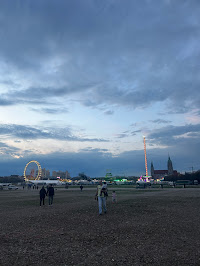After spending 4 months studying in Berlin, I have been lucky enough to learn about the ways Germans entertain themselves. From soccer games to late-night clubbing, there is something for everyone. Upon arrival in February, I felt excited to explore a new city but scared to experience the unknown. Luckily, I had a fantastic group of friends who were just as eager as I was to do everything we could in the time we were there.
After seeing Berlin change from winter to spring and then the early bits of summer, it was cool to see the way it sprouted and opened up into a flourishing and bustling city. The view I had from my room looking out to the trains running in and out of Jannowitzbruke Station all day and night reminded me of how alive the city was. People were going everywhere at all times of the day because, in a city like Berlin, anything is possible. It is a place where a vibrant entertainment culture that offers nightlife, sports, festivals, museums, and celebrations of all kinds thrives. I quickly came to realize that every single person indulged in some type of entertainment daily. Whether it was heading to the park after work or to the sports bar to watch soccer, I felt that there was community everywhere. People always came together to enjoy entertainment and I really valued that.
In each place that I went for entertainment, it felt like there was a collective agreement to live in the now and to embrace the people around you. The nightlife was the most prominent example of this because people came dressed in unique outfits and there was an openness to be yourself. Nobody judged you and everyone was there to have fun and enjoy the music. The parks were also a place where you could go to enjoy yourself while in the company of strangers. My favorite experience was a Sunday in early May when the weather was warmer so a lot of people were out. There were kids playing on the playground, people sitting by the pond, people eating, drinking, running, walking dogs, playing basketball, skating, and more. Everyone was enjoying and entertaining themselves differently but in the same place and it really showed me that there was a big sense of community in the city.
Berlin is also exciting because it offers an extremely rich history. It is a classroom that I was lucky enough to learn in. Almost every place you go you are reminded of what happened there and how it fits into our world history. I went on many excursions with my school to learn about the history of the city, such as the Alte Museum, Bebelplatz, or just a seemingly normal street road that once held Holocaust Victims. Every corner you turn, there is something to be learned.
Although large, Berlin gives one the opportunity to find different types of entertainment in a close vicinity. You can find yourself wandering Museum Island one second and then eating döner across the Spree in Monbijoupark with your friends the next. Don't be surprised if you walk through a flea market or street performance on the way. Berlin also offers one of the best transportation systems in the world, so getting to Tiergarten or the Brandenburg Tor would be a quick trip. I always enjoyed walking from my school building to the Hackescher Markt station because there was always something to see, hear, or smell. I also enjoyed going to the sports bar to watch Premier League games with my friends. The bar was always packed and it was really fun to be in a country where the most popular and loved sport was soccer. It was exciting to see and hear all of the locals cheering for teams. Watching soccer was not the only way I got to enjoy the sport, though. By far my absolute favorite experience was joining a local football club called Berolina Mitte. I truly emerged with Germans and all of the practices were in the language. I became friends with my German teammates and learned more about the lifestyle of German people. My teammates differed a lot in age and it showed me that everyone turned to soccer for fun, no matter what was going on in their outside life.
I am lucky that I got to experience all that is in Berlin. It is a city with vast opportunities for everyone and I cannot wait to go back to experience more of what there is to offer. It is a never-ending place of entertainment of all types from movies to markets to museums and more. The city taught me more about myself - I am smarter and braver than I thought, but I also am vulnerable and still learning about life. I am grateful for the experience and would do it again if I could. Four months is not nearly enough time to spend in a city but it just means I have to go back soon!





























